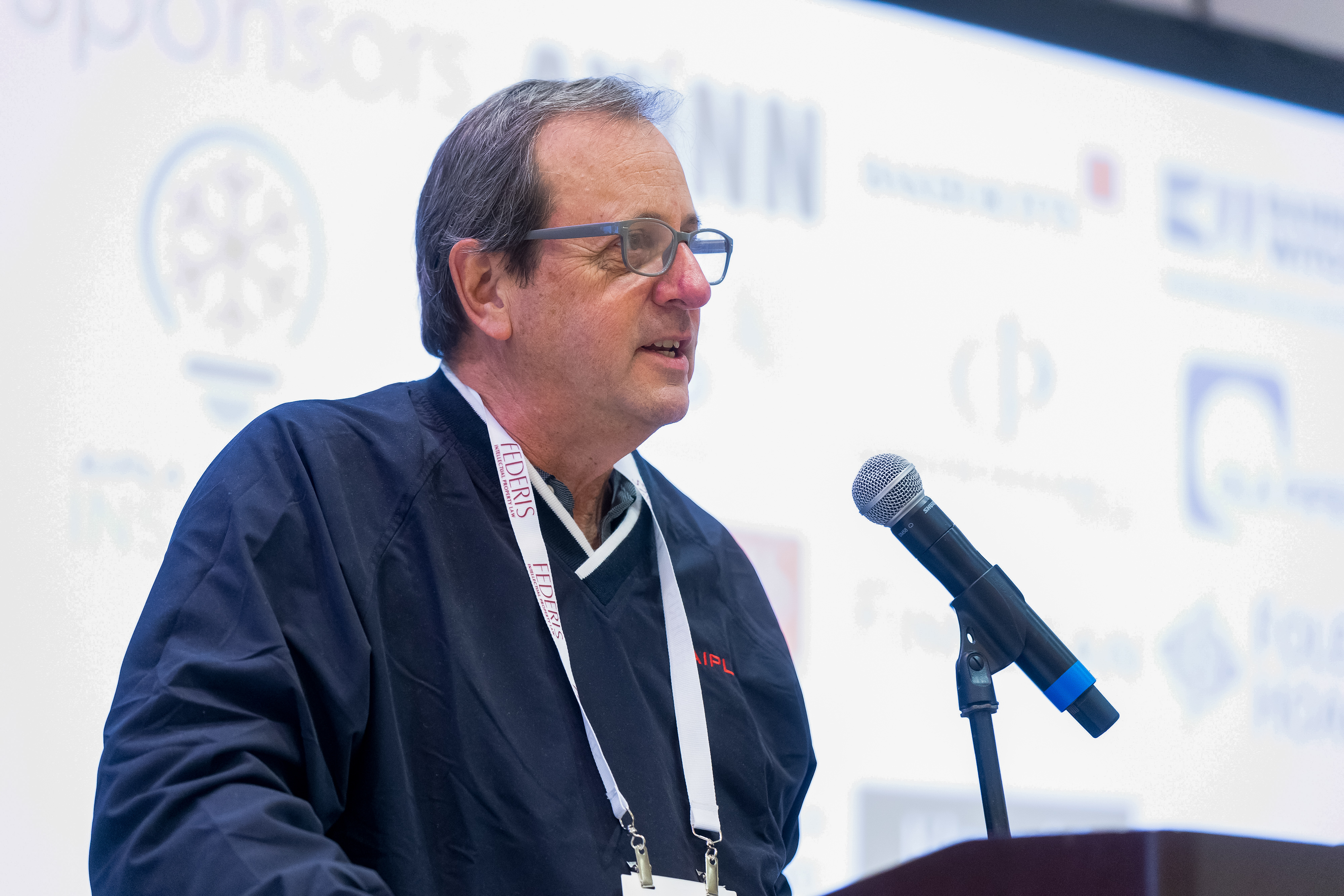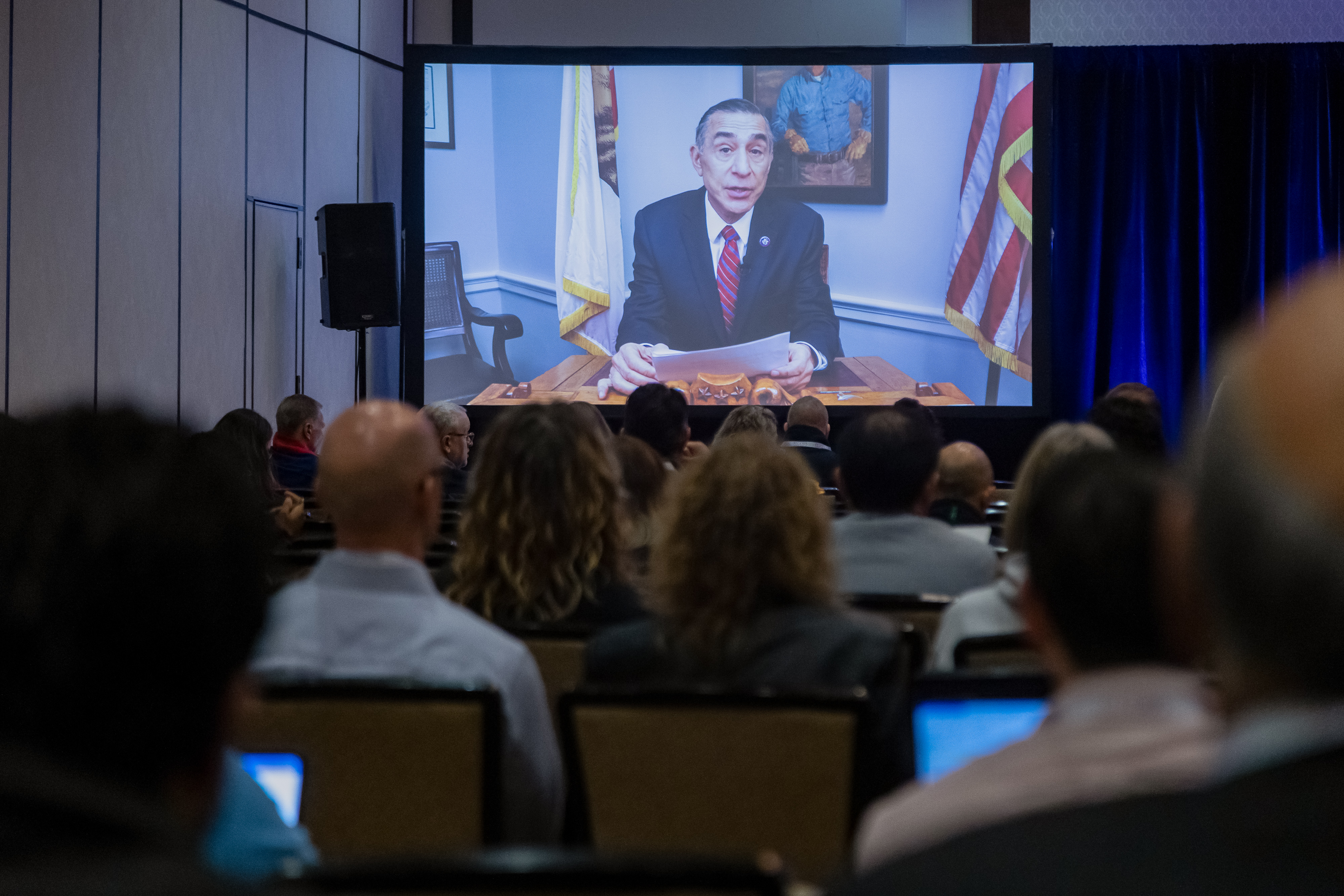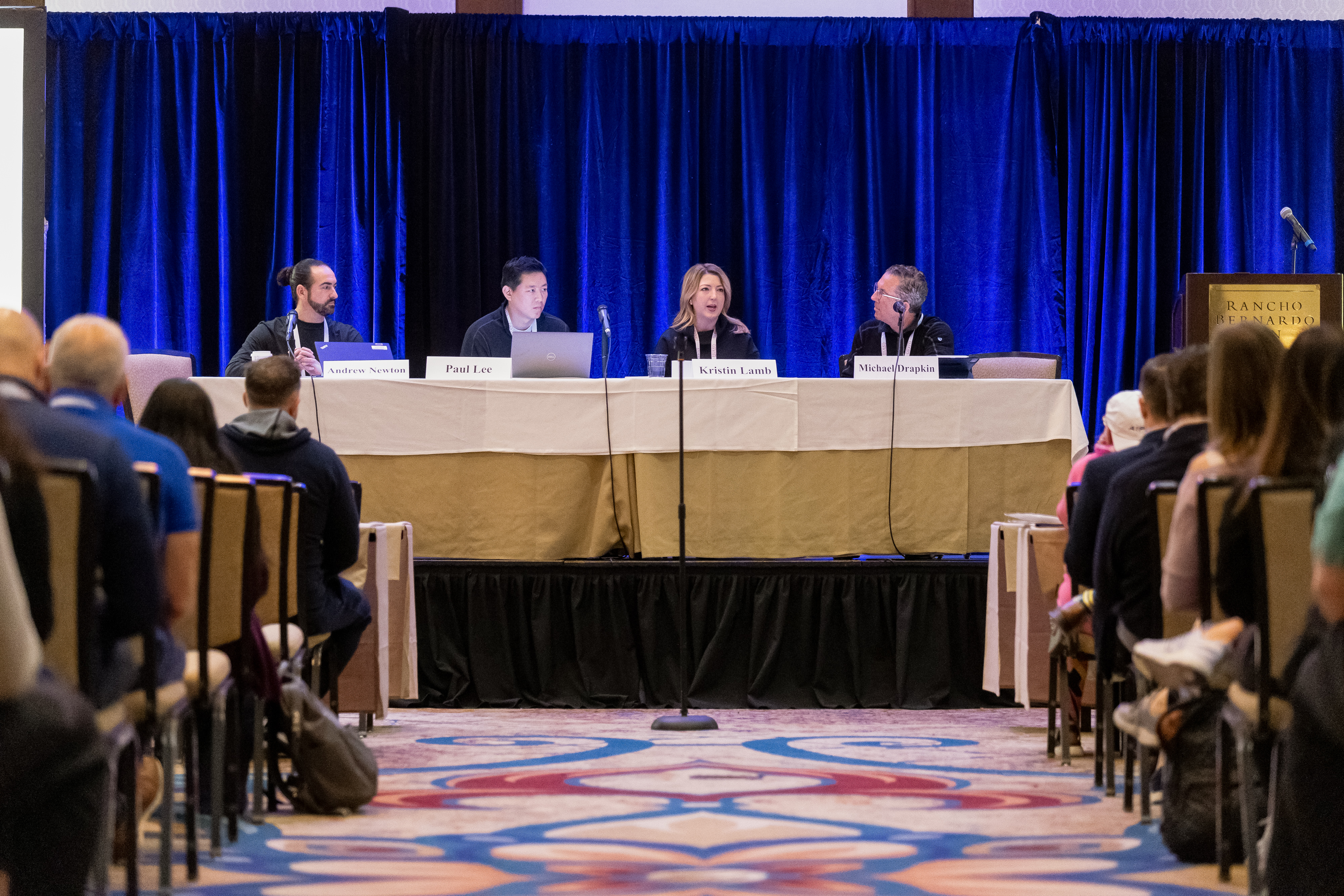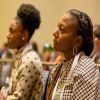2023 Mid-Winter Institute
In This Section
From January 31 – February 3, nearly 350 patent practitioners from around the world joined AIPLA in San Diego for the 2023 Mid-Winter Institute. This Meeting celebrated all things health and wellness in the world of IP. #aiplaMW23 featured an innovative new plenary-only format, introduced the first-of-its-kind Trial Courtyard, and provided the usual high-quality CLE and ample networking and social opportunities.
To read an article, please click on the down arrow to the right of the article title.
 President's Message - Brian H. Batzli - Winter 2023
President's Message - Brian H. Batzli - Winter 2023
Brian Batzli

In reflecting on my term thus far, I am struck by the camaraderie, participation, and energy of AIPLA’s members. The number of members involved in the conferences, road shows, projects, letters, and briefs is exceptional. AIPLA is an opportunity to magnify your voice and make a difference. I encourage everyone to get involved in a committee and attend meetings – in-person or remote. I think you will find both rewarding opportunities and great ways to grow your professional network!
I would like to extend a big thank you to Ann Mueting, the Officer in Charge of the Mid-Winter Institute, committee co-chairs Stephanie Bald, Rae Fisher, and Brian Stanton, and the entire planning committee for putting together such a unique and exceptional program. Since the Covid-19 pandemic, we have found ourselves in a new world. Social interactions have changed. Our workplaces have changed. Our health and wellness outlook has changed. We have sought new ways of working, working out, and staying healthy. In step with these changes, innovation has exploded in the health, sports, and wellness sectors. Not surprisingly, the innovation raises many IP challenges and opportunities.
The 2023 Mid-Winter Institute provided an opportunity to explore these challenges. We learned about nutrition, IP and health startups, wearables and electronic gadgetry, NIL in college and pro sports, and more. Additionally, several health and wellness companies featured their products in our first-of-its-kind Trial Courtyard.
I’m grateful to be serving as your President, and I want to share with you how active AIPLA has been this year. We have been actively engaged with the USPTO on issues such as DOCX and the proposed CLE requirement for registered patent practitioners. Additionally, the AIPLA staff, leadership, and members have been actively involved with roundtables. We met in November with the IP Trilateral Office Heads and Industry groups. We were represented at the USPTO IP Attaches meeting, the Federal Circuit Bar Association Dinner, the IPO Education Foundation Dinner, and attended the Leahy Institute in Naples, Florida.
AIPLA has submitted comments to China on the CNIPA Examination Guidelines and to SAMR on Anticompetition Rules, to the USPTO on the Eligibility Criteria to Practice Before the Office and Practice Before the PTAB, to name a few. We’ve filed numerous amicus briefs, including in Jack Daniels v. VIP Products and Abitron v. Hetronic. You can see the many comment letters and briefs submitted here. We hosted a Trade Secret Summit, organized by the Trade Secret Committee, and have hosted many CLE webinars.
 Representative Darrell Issa (Virtually) Addresses IP Priorities in New Congress
Representative Darrell Issa (Virtually) Addresses IP Priorities in New Congress

Representative Darrell Issa (R-CA) joined the Meeting to give a (virtual) address on the importance of AIPLA and IP.
In his first address since being appointed as the Chairman of the Subcommittee on Courts, Intellectual Property, and the Internet, Rep. Issa emphasized the importance of AIPLA’s work in the intellectual property space. Issa noted his own personal passion and investment in IP as a holder of 37 patents and 40 trademarks.
Noting that under his leadership, the subcommittee plans to continue working in a bipartisan manner on issues such as improving the PTAB process, making it faster and more efficient for patentees, examining the threat of China in IP, the use of patents against U.S. companies, and ensuring the system can accommodate the proliferation of AI-related patents, noting that “we hope to make the system fair, fast and as inexpensive as possible so that we not stifle innovation.”
Rep. Issa urged the Association to continue its work saying, “my goal is to be at your service...to help us do a better job for you.”
Congressman Darrell Issa serves as the representative for California’s 48th district and was recently appointed the Chairman of the Subcommittee on Courts, Intellectual Property, and the Internet.
 Panel Addresses IP Issues in the Age of Wearables and Electronic Gadgetry
Panel Addresses IP Issues in the Age of Wearables and Electronic Gadgetry

One in five Americans are wearing some sort of wearable fitness tracker. Whether it’s the OURA Ring, Apple Watch, Fitbit, or others, Americans are becoming increasingly more aware of their health and fitness stats than any previous generation. COVID-19 only furthered these trends. With many stuck at home, individuals turned to unique ways of staying active and healthy during challenging and stressful times.
The opening plenary at the 2023 Mid-Winter Institute featured a panel of experts from three companies at the forefront of this tech revolution: Kristin Lamb of OURA, Paul Lee of DexCom, and Andrew Newton of Qualcomm. The panel was moderated by Michael Drapkin of Holland & Hart. The panelists addressed both the opportunities and challenges presented in the world of wearables and electronic gadgetry.
The panelists began with an overview of their respective companies: OURA, a company known for their smart ring used to track sleep and physical activity; DexCom, which develops and produces continuous glucose monitoring (CGM) systems for diabetes management; and Qualcomm, a developer of software and services related to wireless technology. All three companies are aiming to create products and services that fit seamlessly into people’s lives. Lamb highlighted the sleek, unobtrusive nature of the OURA ring, Lee noted the small sensors and adhesives that can conduct the CGM, and Newton emphasized the need to make sure wearable devices are always connected, noting that “you don’t want a fitness tracker that only works part of the time or that has limited battery power.”
When asked about the future of wearables, Newton noted the hyper-segmentation of the market, with a variety of tech devices aimed at different age groups, professions, and even pet monitoring. Lee and Lamb both addressed the expansion into greater medical tracking. While DexCom currently measures only glucose, they are always looking to expand and figure out what can be done with data to support people in their medical decisions. Lamb emphasized that while OURA is not a medical device and cannot be used to diagnose, the company is looking for ways to provide even more data points to equip users with as much knowledge as possible about their own health.
On collaboration opportunities and how they affect their IP strategy, Lamb noted that OURA is in a unique position to collect lots of data in a continuous way. With so much data collected, it is important to assess relevant partnerships with other companies. While collaboration is useful, it also can create IP issues related to R&D ownership. Newton noted that Qualcomm wants to continue growing partnerships and look for collaborative ways to address new market segments. Lee expressed similar sentiments, saying that there is currently collaboration between glucose monitors and diabetes pumps, and that they have been aggressive in developing algorithms to determine how much insulin is needed to deliver to patients. Many diabetes pumps manufactured by other companies use DexCom’s algorithms, which makes IP protection and ownership more complex.
 Taking An Exercise Device Company from The First Lap to the Finish Line: IP Considerations for Entering the Sport Device Marketplace
Taking An Exercise Device Company from The First Lap to the Finish Line: IP Considerations for Entering the Sport Device Marketplace
A four-person panel took us through the process of launching and running an exercise device startup and the IP considerations involved. Moderated by Jocelyn Ram of Fountainhead Law, the panel featured Margaret Polson of Polson Intellectual Property Law PC, Karl Fink of Caerus Strength, Matthew Leaper of DataFeel, and Neil Singer of ZeroWheel, LLC. All voiced varying opinions on the IP challenges companies face when launching and protecting new products in the exercise device arena.
Emphasizing the value of design rights and trade dress patents, Polson noted that many startups overlook design patents when they are launching their company or product. While they are low cost, these patents require upfront strategic thinking about the marketability of a product or service saying, “If a product is not visually distinct from other products on the market it will be harder to protect. Something should be designed to be protected and patentable.” Fink agreed that while IP rights are important as a tool in protecting your company, product marketability is key, saying “patent protection is a backup plan to protect your company...the primary part of company is to build a dominant market position.”
Speaking on leveraging IP rights as a tool for starting a business, Leaper addressed the collaborative value in having IP, noting, “having good patents is a key factor in hiring and building a strong team and attracting angel investors who view a patent portfolio as a good indicator of the company’s value and security.”
On knowing when to move from the design phase to filing, Singer explained that to make ZeroWheel distinct, they spent a lot of time creating many designs. One struggle in startups is knowing when to file your patents application, Singer noted, saying, “if you file too early you tip people off before you have a real product...” The key is finding the right balance between a strong patent portfolio that anticipates similar concepts to your products as a defensive strategy and being ready to file and build a functional product.
 Upcoming Events
Upcoming Events
 Upcoming Webinars
Upcoming Webinars
 New Members
New Members
 MW23 Photos
MW23 Photos
Upcoming Events
-
.png?sfvrsn=48c235e_1) 2026 Patent Prosecution Bootcamp - Arlington, VA
2026 Patent Prosecution Bootcamp - Arlington, VA
March 4 to 6, 2026 | Up to 1235 minutes, including 60 Ethics minutes
-
 AIPLA CLE Webinar: Damages 2025 Year-in-Review: Lessons and Litigation Strategies
AIPLA CLE Webinar: Damages 2025 Year-in-Review: Lessons and Litigation Strategies
March 11, 2026 2:00 PM to 3:30 PM | Eligible for up to 90 Mins CLE
-
2026 Women in IP Global Networking Event
April 16, 2026
The annual Global Networking Event connects intellectual property practitioners from around the world for a day of networking, education, and creating meaningful connections. This year’s theme, Rooted in Real - Women in IP Redefining the Narrative, is an opportunity for the AIPLA Women in IP Law Committee to celebrate authentic experiences, foster genuine connections, and showcase the real stories of women shaping the field of intellectual property law. -
-(1).png?sfvrsn=169c8b82_1) Careers in IP
Careers in IP
April 22, 2026 12:30 PM to 1:30 PM | No CLE
-
2026 Trade Secret Summit
April 23 to 24, 2026

